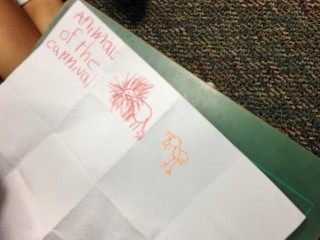Carnival of the Animals is just great music! There are about a thousand different activities and directions that you can explore with your students, so much so that this great work deserves several posts. Today I’m going to share with you how I like to introduce these pieces to my students and why it’s a work that should be revisited.
I’ll be honest and admit that I typically save Carnival of the Animals for May. I save it for May because I find that it just about teaches itself and when I’m busy or tired or just feeling uncreative, Carnival of the Animals is great to make sure that my teaching is as good as it can be ALL of the time even when I’m not at my best.
This last week was just such a time. I caught the BUG! BUG in all caps…. I got SICK SICK SICK! Of course this happened right after TMEA no less!
I missed Monday and then on Tuesday I MADE myself go school on Tuesday. I stayed home Wednesday and Thursday and then on Friday I drug myself to school. I’m back at school today, but guess who doesn’t have a voice? THIS girl!! So needless to say, Carnival of the Animals has become an important part of my teaching this week.
First of all, I use the John Lithgow version of Carnival of the Animals with the older students.
I use the Jack Prelutsky version of Carnival of the Animals with the younger students.
My first goal is to assist my students as they listen to the work. I really want them to experience the work as a whole, at least in the beginning. However, my students aren’t equipped to just sit and listen to much of anything. So I use my handy dandy folded paper to help my young ones increase their listening time. THE BEST part is that my sub can easily do everything I do without a fuss or bother.
Here is what we do.
1. We fold out papers in half 4 times. My students are pretty good folding paper because I find it easier than creating worksheets and running copies.
2. Then they copy the title. I differentiate this for grade level and literacy level.
3. Then while seated in front of the book we are using, they listen to the poem and then during the music they draw the animal.
4. I pause and repeat on some of the songs that are too short to draw and during some of the longer pieces I cut them short so that we can get through several animals in one class.
5. I don’t push the pace of the lesson, but I don’t hold back either. I’ve noticed that my students are proud of their work and often I’ll post some of them outside my wall.
6. If students need to get up and move to the music, we just set down our lapboards, move to the music and come back and draw the animal that we just became.







I shared a room with an Art Teacher. One year I had the kids divide the paper like you did, then in each block they put 1 finger print (borrowed stamp pads) when we listening, students had to use the print as part of the animal that they were listening too…it could become the nose, an eye, the body, kids had fun & some of their creations were great!
I also did this where finger stamps were not feasible with a certain group of kids, so I put 10 different shapes on the board & the kids randomly chose which shape to put in each block. They could choose the size of the shape which could again turn into the body, eye, nose, etc.
Hope you are feeling better!